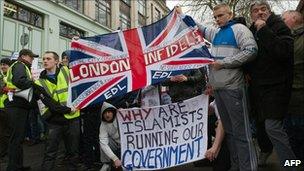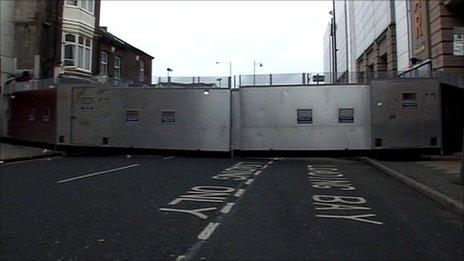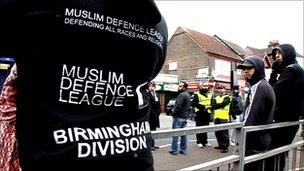Eyewitness: EDL return to Luton
- Published
Abdul Salaam supports the EDL even though he says he is a Muslim
Abdul Salaam is not exactly the kind of person the English Defence League expected to recruit. But there he was, a Muslim willing to stand in the middle of a crowd chanting "Muslim Bombers off our Streets".
We found Glaswegian Abdul in Luton's St George's Square - and he explained why he, a follower of Islam, was standing shoulder-to-shoulder with an organisation accused of Islamophobia.
"The EDL are supporting England, supporting Britain, and I'm British, so why can't I support my country?" he said.
"Have you seen me getting any racist abuse? They applauded me. Why are other Muslims not here? This demonstration is nothing to do with colour or religion. These are people who have watched their country being bombed and they are angry. These are patriotic Englishmen, red-blooded Englishmen."

EDL divisions: Groups from all over the UK
Mr Salaam said he wasn't particularly assiduous about praying five times a day - and that he probably didn't get to a mosque as much as he should. But he insisted he was a true Muslim who thought deeply about his faith - and it was his duty to speak out alongside the EDL.
"I'm here to support Britain and to defend Islam as well," he said. "There are people who, under the name of Islam, blew up trains. They're not Muslims, they're hypocrites. When people have dragged Islam through the mud, it's my duty to speak out as a Muslim."
This was not the demonstration the EDL hoped it would be.
The police say there were 1,500 EDL supporters in the town, plus another 1,000 in the Unite Against Fascism counter-demonstration.
What had been billed as a demonstration "Back To Where It All Began" did not have the air of a triumphant movement sweeping all before it.
The EDL is almost two years old - but police forces have now developed tactics to prevent a repeat of some of the early three-way violent clashes between EDL supporters, anti-racism campaigners and fired-up young Muslim men.
The risk of those clashes disappeared behind massive steel barriers that the police used to seal the EDL in to St George's Square. They wanted to make a show in the hometown of their founders - but there was nobody around to see it.

On the streets of England: Police barrier in Luton
Luton was a ghost town. Large parts were deserted from 10am. Police had warned businesses what to expect - and owners shut up and boarded up.
The massive £800,000 police operation worked - but at some cost to the local economy.
But many of the EDL's supporters who turned out for the speeches thought it was still a day well spent. Their leaders described the movement as a bulwark against terrorism. They praised Prime Minister David Cameron's speech earlier the same day, in which he attacked multiculturalism.
Stephen Lennon, aka Tommy Robinson, one of the movement's founders, looked on chuffed as the crowd sang about joining "Tommy's revolution".
The EDL's leaders say the movement isn't racist - but many of the placards were pretty offensive to the few ordinary Muslims who saw them. And with the British National Party suffering internal battles, the organisation is now attracting the attention of a wide spread of international far right anti-Islamic activists.
Among those who had flown in was the bearded figure of Nachum Shifren, a controversial Los Angeles Rabbi.
"I'm a supporter of the EDL," he said, standing next to a group of cropped-haired men from the EDL's Walsall, Leeds and Essex "divisions".
"I see radical Islam popping up, I see governments caving in to it. I see a lot of lawlessness going on because of political correctness.
"I believe in the EDL and I don't want England to go the way of Paris. Do you realise there is a mile down the street where I cannot walk and get out alive?"
He was referring to Bury Park, the heart of Luton's Muslim communities - and this claim of "no go" areas for white people around the country was repeated time and time again by EDL members we interviewed.
Communities in fear
But when we went to Bury Park, it was fairly clear that it was the local Muslim residents who were scared.

Standing by in Bury Park: Young men on the watch
Just like in town, entire parades of shops had closed. Women and children were nowhere to be seen on what should have been the busiest day of the week.
Men and teenage boys were out in some force, nervously looking in the direction of the town centre and the police lines at the bottom of the hill.
Conspicuous by their absence, though, was the small group of hardcore Islamists whose 2009 protest against soldiers returning to Luton from Afghanistan had caused so much anger across the town.
Stewards - one of whom was a local Christian clergyman - politely asked visitors to identify themselves - but also asked anti-racist campaigners to keep out to avoid inflaming tensions.
Jangir Khan, chairman of the Bury Park Business Association, was among those involved in organising the community's security - but like everyone else, he wasn't happy.
"This is the busiest day of the week for the local economy," he said. "If you close, then you lose 100% of income. Those who've stayed open have probably lost 90% because nobody is coming out. They are stuck in their homes.
"We asked for the EDL to be banned from this town and the police said it couldn't be done. Well what about our human rights to go about our daily lives without fear?"
Some young men had travelled down from Birmingham, presenting themselves as the "Muslim Defence League". They were small in number and did not attempt to stage a public show of strength.
Overall, the Bury Park community had decided, in the words of one local leader, to make a dignified stand together, rather than to puff out their chests and make confrontational noises.
Video and production: Almeena Ahmed